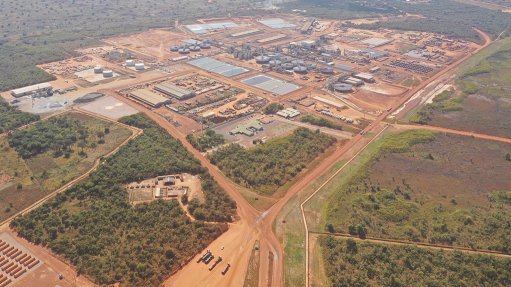Key Indian minerals legislation hits stone wall
KOLKATA (miningweekly.com) – The Bharatiya Janata Party- (BJP-) led Indian government has hit a stone wall in Parliament that is likely to put a spate of legislative initiatives on the backburner.
The Mine and Minerals (Development and Regulation) Amendment Bill faced the combined resistance of the opposition party in the Rajya Sabha, the upper house of Parliament, where BJP did not enjoy a majority and the legislation failed to muster support on Tuesday.
The government was able to pass the Bill in the lower house – Lok Sabha – where it enjoyed a comfortable majority. Failure to do so in the upper house was expected to push the Bill into the realm of protracted legislative uncertainty.
The combined opposition on the upper house demanded that the Bill be referred to a select committee of Parliamentarians for further scrutiny, which, in effect, would put the legislation beyond any specific timeframe.
The political parties opposing the mining reforms legislation refrained from voting on the Bill in the upper house and instead moved toward putting it on the backburner. The strategy was to not give the government the option of calling for a joint session of both the upper and lower houses where the government would enjoy a majority and pass the legislation.
In effect, the failure of getting Parliamentary approval for the Bill would mean that the government would not have the legal framework in place to adopt the auction route for allocation of iron-ore, bauxite and limestone resources to various user industries.
Based on the ordinance that preceded the Bill, the government had already drawn up plans to start auctions of various mineral resources in May 2015.
However, some officials in the Mines Ministry said that the government would have the option to promulgate the mines ordinance for a second time, once the current session of Parliament has ended. But doubts persisted whether investors would be keen to put in bids and make financial commitments based on temporary ordinances with a shelf life of six months and not a long-term legal framework in place, the officials opined.
With mining sector legislation now almost in a limbo, a similar fate awaited the government’s legislation on land acquisition that ostensibly aimed to reduce delays in acquiring large tracts of land for industry.
Christened the Right to Fair Compensation and Transparency in Land Acquisition, Rehabilitation and Resettlement Amendment Bill 2015, it was similarly passed in the Lok Sabha, the lower house, on Tuesday but a similar fate awaited it in the Rajya Sabha, the upper house, where the government does not have a majority.
A new land acquisition law was first ushered in by the previous government in 2014, but opposition parties had combined against it, claiming that the present government, under the garb of amending the law, had diluted several provisions against the interest of the farming community.
The bone of contention between the government and the opposition was the scrapping of a mandatory social-impact assessment (SIA) report for any land acquisition for industry and minimum mandatory consent from owners of land.
Opposition to amendments to the land acquisition laws was snowballing into a countrywide movement beyond Parliament. Social activist and anti-corruption crusader, Anna Hazare announced this week that he would lead a 1 100 km march of farmers across the country, culminating in a rally in New Delhi protesting the government’s ‘anti-farmer’ laws for forcible land acquisition.
The fate of the Coal Mines Special Provisions Bill 2015, replacing the Coal Mines Special Provisions Ordinance, also hung by the slender thread. The coal Bill too had been passed by the lower house, but was facing similar uncertainty in the upper house.
The coal ordinance, which enabled the government to go ahead with the auction of coal blocks to various user industries, was scheduled to lapse end-March and the failure to replace it by the passing of a Bill would open up a legal Pandora’s Box regarding the auction process already completed.
The Indian government had already earned about $31-billion through the auction of 32 coal blocks in the first tranche of 204 coal block allotments which were cancelled by the Supreme Court.
Comments
Press Office
Announcements
What's On
Subscribe to improve your user experience...
Option 1 (equivalent of R125 a month):
Receive a weekly copy of Creamer Media's Engineering News & Mining Weekly magazine
(print copy for those in South Africa and e-magazine for those outside of South Africa)
Receive daily email newsletters
Access to full search results
Access archive of magazine back copies
Access to Projects in Progress
Access to ONE Research Report of your choice in PDF format
Option 2 (equivalent of R375 a month):
All benefits from Option 1
PLUS
Access to Creamer Media's Research Channel Africa for ALL Research Reports, in PDF format, on various industrial and mining sectors
including Electricity; Water; Energy Transition; Hydrogen; Roads, Rail and Ports; Coal; Gold; Platinum; Battery Metals; etc.
Already a subscriber?
Forgotten your password?
Receive weekly copy of Creamer Media's Engineering News & Mining Weekly magazine (print copy for those in South Africa and e-magazine for those outside of South Africa)
➕
Recieve daily email newsletters
➕
Access to full search results
➕
Access archive of magazine back copies
➕
Access to Projects in Progress
➕
Access to ONE Research Report of your choice in PDF format
RESEARCH CHANNEL AFRICA
R4500 (equivalent of R375 a month)
SUBSCRIBEAll benefits from Option 1
➕
Access to Creamer Media's Research Channel Africa for ALL Research Reports on various industrial and mining sectors, in PDF format, including on:
Electricity
➕
Water
➕
Energy Transition
➕
Hydrogen
➕
Roads, Rail and Ports
➕
Coal
➕
Gold
➕
Platinum
➕
Battery Metals
➕
etc.
Receive all benefits from Option 1 or Option 2 delivered to numerous people at your company
➕
Multiple User names and Passwords for simultaneous log-ins
➕
Intranet integration access to all in your organisation


















